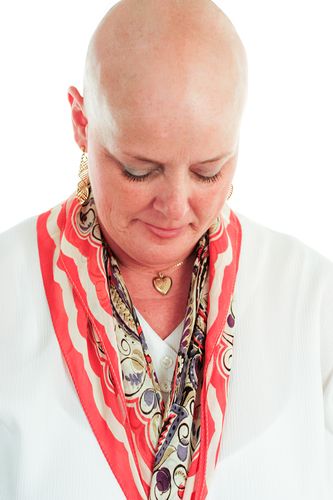 Hair loss is a frequent side effect of different types of cancer treatments. The resulting baldness can sometimes be permanent, but that typically happens only in extremely rare cases.
Hair loss is a frequent side effect of different types of cancer treatments. The resulting baldness can sometimes be permanent, but that typically happens only in extremely rare cases.
How long it takes for hair to regrow depends on the type of treatment. Here’s a rough idea of what cancer treatment patients can expect as their hair begins to grow back.
Radiation treatment can result in a particularly long regrowth period for hair. Radiation can lead to hair loss because it damages healthy cells in addition to the targeted cancer cells. Faster-growing cells like those inside hair follicles tend to be more vulnerable to radiation damage.
Radiation treatment tends to cause hair loss just in the area of the body that the radiation beam is aimed. Unlike chemo, which can cause hair loss everywhere, radiation that’s directed elsewhere in the body besides the head won’t cause the patient’s head hair to fall out.
But patients who go through radiation treatment for brain cancer may end up losing some or all of their head hair. The amount of hair loss can depend on the size of the area being treated and how much radiation is administered.
Hair lost to radiation treatment tends to grow back very slowly. It may take as much as four to six months just to get an inch of growth. Sometimes hair grows back with different color or texture: it may be thinner than before, and sometimes hair that was originally straight grows back curly.
For women who take the drug tamoxifen for breast cancer, hair loss may be less pronounced but may last longer. Tamoxifen patients often experience a thinning of the hair that levels off after about a year. But the hair will remain thin for as long as the patient’s course of tamoxifen, which can last five years or more.
Hair Loss After Chemo
Chemo, like radiation treatment, causes hair loss by attacking the faster-growing cells in the body. But unlike with radiation, the hair loss caused by chemo tends to happen over the entire body.
Hair lost after chemo tends to grow back a little more quickly. Typically hair will start to regrow as a soft fuzz about two to three weeks after the end of chemo. It usually takes a few weeks after that for normal hair to begin growing at its normal rate. Within about two months after chemo, hair has usually regrown about an inch.
Chemo hair loss can vary depending on the type of drugs used. Some women who were treated with the drug Taxotere have reported their hair did not grow back even after chemo stopped. According to studies by the drug’s manufacturer, about 3 percent of patients who take Taxotere in combination with other chemo drugs suffer from “persistent alopecia,” or hair loss.
Taxotere is a chemo drug sometimes used to treat breast cancer. A typical course of Taxotere may involve fewer chemo cycles than alternative drugs such as Taxol, which has a lower associated risk of hair loss. But some doctors and patients feel strongly that patients should be warned about the risk of permanent hair loss before they decide to undergo treatment with Taxotere.
Do YOU have a legal claim? Fill out the form on this page now for a free, immediate, and confidential case evaluation. The attorneys who work with Top Class Actions will contact you if you qualify to let you know if an individual lawsuit or Taxotere class action lawsuit is best for you. [In general, Taxotere lawsuits are filed individually by each plaintiff and are not class actions.] Hurry — statutes of limitations may apply.
ATTORNEY ADVERTISING
Top Class Actions is a Proud Member of the American Bar Association
LEGAL INFORMATION IS NOT LEGAL ADVICE
Top Class Actions Legal Statement
©2008 – 2025 Top Class Actions® LLC
Various Trademarks held by their respective owners
This website is not intended for viewing or usage by European Union citizens.
Get Help – It’s Free
Join a Free Taxotere Class Action Lawsuit Investigation
If you received intravenous chemotherapy treatment for breast cancer and were told that your hair would grow back but it never did, you may have a legal claim. Join this free Taxotere class action lawsuit investigation now!
An attorney will contact you if you qualify to discuss the details of your potential case at no charge to you.
Oops! We could not locate your form.












